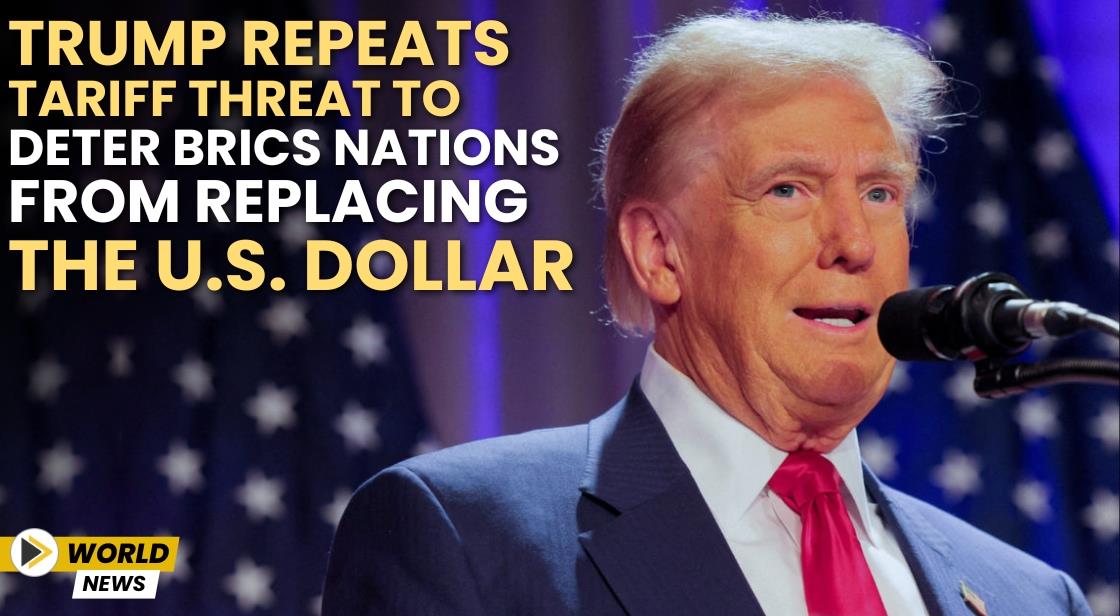Trump Repeats Tariff Threat to Deter BRICS Nations from Replacing the U.S. Dollar

News Synopsis
Former U.S. President Donald Trump has once again issued a strong warning to BRICS nations, reiterating his stance against any move to replace the U.S. dollar as the global reserve currency.
On Thursday, Trump emphasized his previous 100% tariff threat, which he first made after securing victory in the November presidential elections.
"We are going to require a commitment from these seemingly hostile Countries that they will neither create a new BRICS Currency, nor back any other Currency to replace the mighty U.S. Dollar or, they will face 100% Tariffs," Trump stated on Truth Social, mirroring a post he had shared on November 30.
BRICS Currency Plans and Global Reactions
The BRICS bloc—comprising Brazil, Russia, India, China, and South Africa—has been exploring alternatives to the U.S. dollar in international trade, particularly after Western nations imposed sanctions on Russia following its military actions in Ukraine.
Although BRICS does not currently have a common currency, discussions regarding its formation have gained momentum in recent years.
U.S. President Donald Trump, however, dismissed such possibilities outright, asserting:
"There is no chance that BRICS will replace the U.S. Dollar in International Trade, or anywhere else, and any Country that tries should say hello to Tariffs, and goodbye to America!"
In response to Trump’s remarks, Russia had earlier cautioned that any American attempt to enforce global reliance on the U.S. dollar could backfire, potentially accelerating the move away from dollar-based transactions in global trade.
Tariff Threat Extends to Mexico and Canada
Trump’s warning to BRICS comes amid uncertainty over his tariff policies towards North American trade partners. Mexico and Canada are currently awaiting his decision regarding 25% tariffs on imports from these nations, which he has proposed to implement starting February 1.
Trump aims to use tariffs as leverage to pressure Mexico and Canada to take stronger measures against illegal migration into the U.S. and curb the smuggling of dangerous drugs such as fentanyl.
The U.S. Dollar's Continued Dominance in Global Trade
Despite growing discussions around de-dollarization, the U.S. dollar remains the world’s dominant reserve currency. A 2023 study by the Atlantic Council’s GeoEconomics Center highlighted that neither the euro nor the BRICS nations have succeeded in significantly reducing global dependence on the dollar.
The dollar’s strength has been reinforced by several factors, including:
-
The robust U.S. economy
-
Tighter monetary policies by the Federal Reserve
-
Heightened geopolitical risks, making the dollar a safe-haven currency
At the same time, global economic fragmentation has prompted BRICS members to increase trade in alternative currencies, including the Chinese yuan and local currency settlements.
The Evolution of BRICS and Its Expansion
The BRICS bloc originated as "BRIC" in 2001, when the term was first introduced by Jim O’Neill, then-chief economist at Goldman Sachs, in a research paper highlighting the economic potential of Brazil, Russia, India, and China.
The group formally became BRICS in 2010, following the inclusion of South Africa. In 2023, BRICS expanded further, adding Egypt, Ethiopia, Iran, and the UAE to its ranks. Most recently, Indonesia joined the group earlier this month, marking another significant expansion of the alliance.
Conclusion: The Future of Global Currency Power Dynamics
Trump’s renewed tariff threats reflect his strong commitment to maintaining U.S. economic dominance, particularly in global trade and finance. While BRICS continues to push for alternatives to the U.S. dollar, the strength of the American economy and its monetary policies continue to reinforce dollar supremacy.
However, with the BRICS bloc expanding and global trade shifting, the coming years could witness further discussions and policy shifts as nations explore alternative financial systems. Whether Trump follows through on his tariff threats or adjusts his approach remains a key issue to watch in global economic diplomacy.









